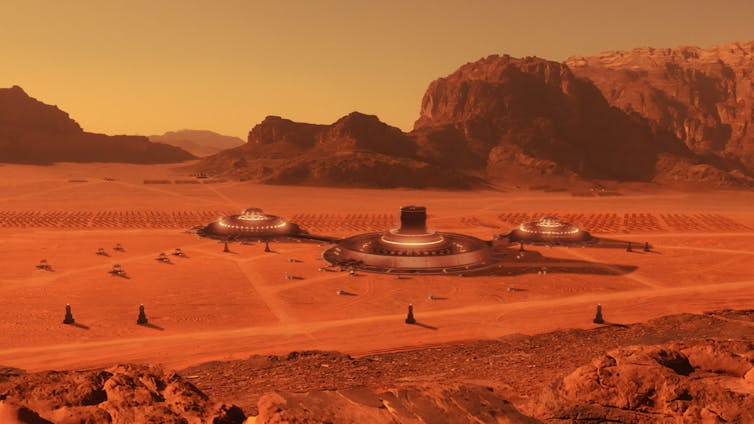The past decade has seen a rapid expansion of the commercial space industry. Rival nations are competing for prime military and economic positions beyond the Earth. Public and private entities are clamoring to mine the Moon, and a growing halo of space junk is polluting low Earth orbit.
In a 2023 white paper, a group of concerned astronomers warned against repeating Earthly “colonial practices” in outer space. But what’s wrong with colonizing space if there’s nothing there to begin with?
I am a philosopher of science and religion who has been writing about the space industry for several years. As government agencies and private companies turn their eyes toward the stars, I’ve noticed many of the factors that drove European Christian imperialism between the 15th and 19th centuries reappearing in high-speed, high-tech forms.
Some of these colonial practices might include the enclosure of land, the exploitation of environmental resources and the destruction of landscapes – in the name of ideals such as destiny, civilization and the salvation of humanity.
Many space industry leaders, such as Mars Society President Robert Zubrin, argue that although European-style colonialism may have had unsavory consequences on Earth, it is the only way to proceed in outer space. In fact, he warns, any attempt to slow down or regulate the space industry will make the Martian frontier inaccessible to humanity, leaving us stuck on an increasingly dull and decadent Earth.

Many space industry leaders, such as Robert Zubrin and Elon Musk, have imagined building human colonies on Mars. Both have argued that regulation in the space industry might hinder progress toward this goal.
janiecbros/E+ via Getty Images
Zubrin has argued against concerns about colonialism in space. Unlike the Earth, outer space is empty, he claims. Why should anyone care about the rights of rocks and a few hypothetical microbes? But as it turns out, not everyone agrees that outer space is empty. And as the concerned astronomers have argued, abandoning the colonial playbook would benefit industry insiders and outsiders alike.
Is space really empty?
People of Bawaka Country in northern Australia have told the space industry that their ancestors guide human life from their home in the galaxy, and that this relationship is increasingly threatened by large orbiting satellite networks.
Similarly, Inuit elders say their ancestors live on celestial bodies. Navajo leadership has asked NASA not to land human remains on the Moon. Kanaka elders have insisted that no more telescopes be built on Mauna Kea, which Native Hawaiians consider to be ancestral and sacred.
These Indigenous positions stand in stark contrast with many in the industry’s insistence that space is empty and inanimate.
The key to reconciling these vastly different positions is to seek agreement – not on beliefs or worldviews, but rather on behavior. Secular space…


